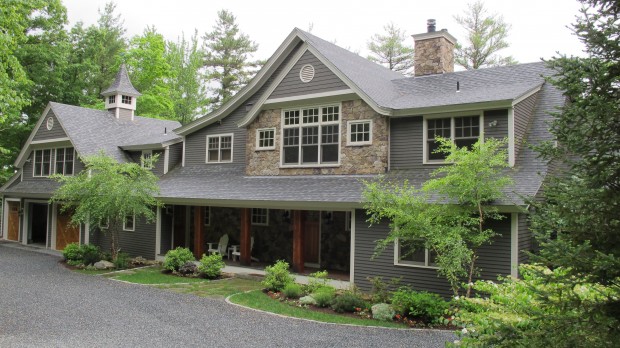Lakes Region Snapshot: High-End Vacation Homes Impact Year-Round Economy

Amanda Loder / StateImpact New Hampshire
The market for high-end lakefront properties has slowed down along Lake Winnipesaukee.
Tomorrow morning on NHPR, we’ll hear more from Joe Skiffington, a builder of high-end vacation homes in the Lakes Region. Joe’s story is Part Six of our series “Getting By, Getting Ahead,” examining how people across New Hampshire’s seven regions are navigating a recovering economy.
___
Driving through New Hampshire’s Lakes Region, it’s not uncommon to stumble onto networks of private roads. They lead to waterfront mansions — summer getaways for wealthy executives from places like Boston and New York. One of them, on Lake Winnipesaukee, belongs to Mitt Romney, the presumptive Republican nominee for president, whose family gathered here for an annual vacation earlier this month.
Wealthy tourists like the Romneys are crucial to the region’s economy, pumping much needed cash into local businesses for three months a year. For year-long residents, however, this dynamic creates high fiscal peaks and deep valleys. After the summer boom, restaurants don’t need as many waiters, there isn’t as much demand for household goods and construction projects slow down. For a New Hampshire region known nationally as a playground of the rich, the Lakes Region has the state’s second highest poverty rate — 6.5 percent — according to a StateImpact analysis of U.S. Census data.
Rich vacationers and year-rounders were affected differently by the housing bust, too.
The Bubble That Never Burst
During the last decade, prices went up fast for housing at both the low and high ends of the market. “It certainly was a very heated market in the early [2000’s], wherein you’d see double-digit appreciation, properties would sell quickly, sometimes more than one buyer for the property, bidding prices up,” says Russ Thibeault, an economist with Applied Economic Research in Laconia.“I remember standing on a dock in Wolfeboro, and somebody pointing out a house across the bay that sold for like $300,000,” Thibeault recalls. “And I said, ‘Oh, my God! That’s a lot.’ And they said, ‘No, no! It just resold 12 months later for $600,000.’ So things were just crazy for a period of time, and it’s hard to say where we all thought it would end, because it wasn’t ending.”
Prices on homes in the $300,000 range all the way up to multi-million dollar McMansions continued to climb, even through the beginning of the recession. A handful of builders were putting up speculative homes, buying the land and building high-end houses in the belief that they could unload them quickly and at a big profit. And right up through 2007 and into 2008, they did.
Listen to voices of New Hampshire’s economy and share your story in an interactive audio experience »
“Since then, I think that [it’s] not so much a bubble that burst, but things just totally flattened out,” Thibeault says. “Right now, we have about 95 units on Winnipesaukee alone that are priced over $1.5 million. And we had about 20 sales last year. But they haven’t really deteriorated in value as compared to the year-round housing market. Some properties have gone down in value a bit, but you don’t see an overall trend toward decline.”
Although their investments took a big hit during the recession, Thibeault notes that the people who own these high-end homes are generally in a financial position where they can hold out for prices closer to what they paid. That has helped keep the market relatively stable. In the case of New Hampshire’s year-round market, though, homeowners under severe financial strain simply had to cut their losses, which helped push prices downward.
Speculative Building Slowdown
Thibeault says right now, there’s a “break” in the Winnipesaukee seasonal home market, where vacation homes priced at less than $1.5 million are continuing to sell. Meanwhile, homes on the upper-most end of the market are “languishing.” Speculative home building has been down since 2008. The construction slowdown has affected the Lakes Region economy on a number of levels, says Thibeault, who sits on the board of the Bank of New Hampshire, which has financed a number of area spec home builders and developers.
“When you cut back on new construction, you cut back on a wide swath of this region’s economy because we’re very dependent on the construction industry. So you’re looking at furniture store sales that aren’t as great, a lot of service industry, painters, landscapers,” Thibeault says. “I had a friend who pretty much had a full-time job doing painting at one of these very large, affluent homes. He would work every spring and fall painting inside and outside the house. That’s not happening anymore. So it has a broad effect on the regional economy.”
There is some good news, however. A couple of home builders are dipping their toes back into the spec market this year. And Thibeault says that while the big money new-home starts aren’t as prevalent as they once were, wealthy tourists are investing in their existing vacation homes by ordering renovations.
“We were acclimated to really an unsustainable pace of price appreciation and construction on the lake. And both the price appreciation and the level of construction activity have subsided,” Thibeault says. “But it’s still not a disaster real estate market by a long shot. It’s still there, there’s still a lot of health in the market, although it’s not improving or moving as quickly as we were accustomed to.”





